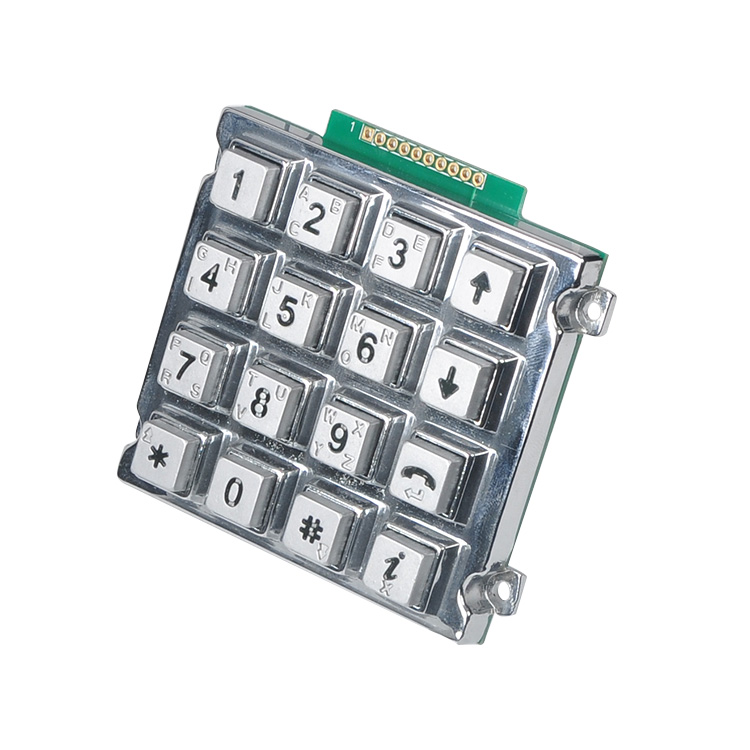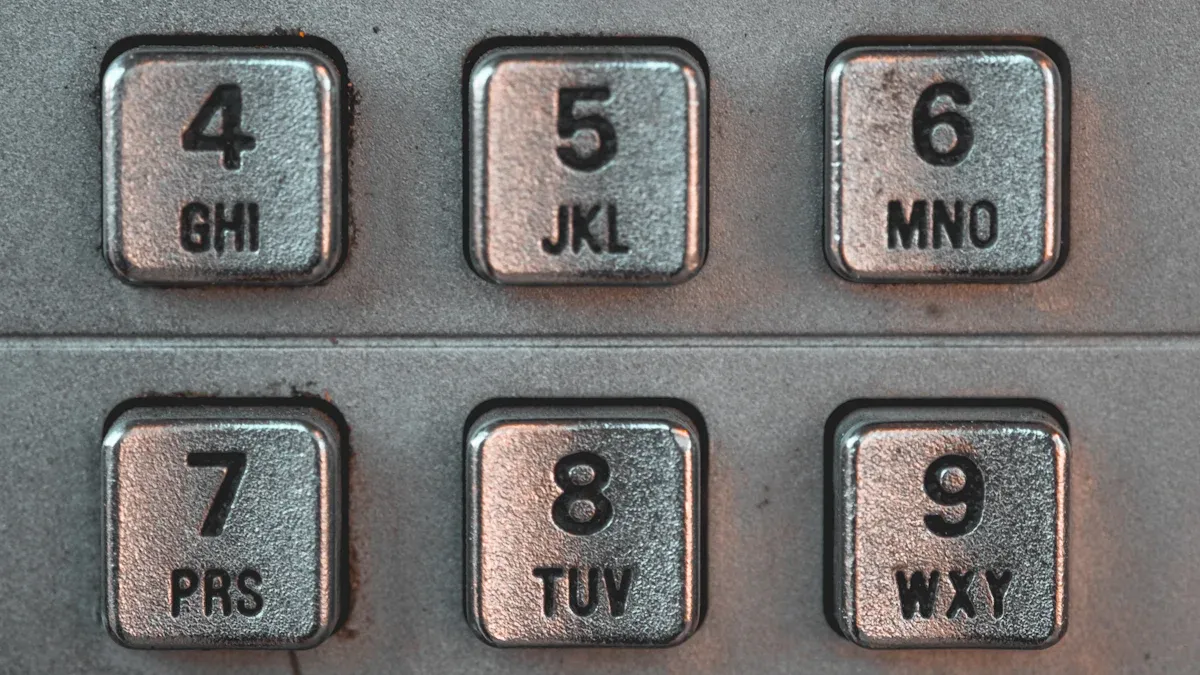
Stainless steel keypads offer exceptional strength and reliability. Their robust design withstands heavy use and harsh conditions. An industrial metal keypad resists damage, delivers consistent performance, and helps maintain hygiene. These qualities make them the preferred choice in demanding environments where durability, safety, and cleanliness matter most.
Key Takeaways
- Stainless steel keypads resist damage, last longer, and perform reliably in tough industrial environments where plastic keypads often fail.
- Their sealed, non-porous surfaces make cleaning easy and help prevent contamination, supporting strict hygiene standards in food, healthcare, and labs.
- Though pricier upfront, stainless steel keypads save money over time by reducing maintenance, replacements, and downtime while offering strong security against vandalism.
Industrial Metal Keypad Durability and Longevity

Resistance to Physical Damage
Industrial environments often expose equipment to accidental impacts, drops, and rough handling. An industrial metal keypad stands out for its ability to resist physical damage. Stainless steel construction provides a tough barrier against dents, cracks, and breakage. This strength ensures that the keypad continues to function even after repeated use or accidental knocks.
The following table highlights the difference in impact resistance between stainless steel and plastic keypads:
| Material | Average Impact Resistance Rating | Additional Notes |
|---|---|---|
| Stainless Steel | IK09 | High impact resistance; commonly IP65/IP66 rated |
| Plastic | N/A | No specific IK or impact resistance ratings found |
Stainless steel keypads typically achieve an IK09 impact resistance rating. This rating means the device can withstand strong impacts, making it suitable for demanding industrial settings. Plastic keypads, on the other hand, do not have a specified impact resistance rating. They often crack or break under similar conditions. As a result, an industrial metal keypad offers a clear advantage in environments where equipment faces frequent physical stress.
Lifespan in Harsh Environments
A long operational lifespan is essential for any device used in challenging conditions. Stainless steel industrial keypads deliver impressive durability, even when exposed to harsh environments. These keypads often last from 500,000 to over 1,000,000 cycles. Their robust design, corrosion resistance, and mechanical strength contribute to this extended lifespan.
Stainless steel keypads maintain performance in the face of dust, moisture, and temperature changes. Plastic models, however, tend to weaken and fail more quickly when exposed to similar stressors.
Factors such as environmental exposure, electrical load, and maintenance can affect how long a keypad lasts. Still, the superior toughness of an industrial metal keypad ensures reliable operation over time. In contrast, plastic keypads show reduced durability and require more frequent replacement. This difference makes stainless steel models the preferred choice for industries that demand long-lasting, dependable equipment.
Industrial Metal Keypad Performance and Safety
Resistance to Chemicals, Moisture, and Temperature Extremes
Industrial environments often expose equipment to aggressive chemicals, high humidity, and extreme temperatures. Stainless steel keypads excel in these conditions. Their sealed construction prevents moisture and dust from entering, which helps maintain reliable operation. Many models meet certifications such as IP65, IP66, and even IP69K, which means they resist water jets, dust, and even high-pressure steam cleaning. Plastic keypads rarely achieve these ratings and often degrade when exposed to solvents or temperature swings.
| Certification/Standard | Description | Stainless Steel Keypads | Plastic Keypads |
|---|---|---|---|
| IP65-IP69K | Waterproof/Dustproof | ✔️ Typically met | ❌ Rarely met |
| Chemical Resistance | Withstands solvents, oils | ✔️ Typically met | ❌ Rarely met |
| MIL-STD 810G | Military-grade durability | ✔️ Typically met | ❌ Rarely met |
Stainless steel surfaces also resist corrosion and chemical attack, making them ideal for food processing, laboratories, and outdoor installations. This resilience ensures that an industrial metal keypad continues to function where plastic models would fail.
Consistent Functionality Under Heavy Use
Industrial settings demand equipment that can withstand frequent and sometimes forceful use. Stainless steel keypads maintain consistent performance even after hundreds of thousands of actuations. Their robust construction and metal dome switch technology provide tactile feedback and prevent wear on contact points. In contrast, plastic keypads often show signs of wear, such as faded legends or sticky keys, after prolonged use.
Stainless steel keypads are preferred in environments requiring ruggedness, vandal resistance, and long operational life. Applications include access control systems, kiosks, vending machines, and explosion-proof areas.
This reliability supports uninterrupted workflow and reduces downtime, which is critical in manufacturing, transportation, and public access systems.
Ease of Cleaning and Sterilization
Hygiene plays a vital role in industries such as food processing and healthcare. Stainless steel keypads offer smooth, non-porous surfaces that simplify cleaning and disinfection. Facilities follow strict cleaning protocols to ensure safety and compliance:
- Staff perform hand hygiene and wear protective equipment before cleaning.
- They inspect the keypad for visible dirt or damage.
- Approved stainless steel cleaners or disinfectants are applied with a microfiber cloth, following the grain of the metal.
- Disinfectants remain on the surface for the recommended contact time.
- Staff avoid abrasive materials and harsh chemicals that could damage the keypad.
- Surfaces are rinsed and dried thoroughly.
- Maintenance needs are documented, and cleaning records are maintained.
In food processing, protocols include pre-cleaning, sanitation with chlorine-based solutions, and thorough drying. Medical environments require frequent cleaning with healthcare-approved disinfectants and strict adherence to regulatory standards. These practices help maintain a sterile environment and prevent contamination.
Reduced Risk of Contamination
Stainless steel keypads help reduce the risk of contamination in sensitive environments. Their sealed design prevents ingress of liquids and debris, which supports compliance with hygiene and safety regulations. The non-porous surface resists bacterial growth and allows for effective sterilization. Facilities benefit from reduced risk of cross-contamination, especially in healthcare and food production.
- Stainless steel keypads support compliance with hygiene standards in medical and laboratory environments.
- Their rugged, waterproof construction enables easy cleaning and disinfection.
- These features help facilities meet safety regulations related to equipment reliability, environmental protection, and hygiene.
An industrial metal keypad provides a safer, cleaner interface compared to plastic models, making it the preferred choice for industries where contamination control is critical.
Cost-Effectiveness and Security of Industrial Metal Keypads
Lower Maintenance and Replacement Costs
Industrial metal keypads offer significant savings over time. Their stainless steel construction resists wear, corrosion, and physical damage. Facilities experience fewer breakdowns and less downtime. Maintenance teams spend less time on repairs or replacements. This durability reduces the need for frequent part orders and service calls. In contrast, plastic keypads often require more attention due to cracking, fading, or malfunctioning buttons. Companies that choose metal keypads benefit from lower operational costs and improved productivity.
Return on Investment
An industrial metal keypad delivers a strong return on investment. The initial purchase price may be higher than that of a plastic model, but the long-term savings outweigh the upfront cost. These keypads last longer and maintain performance in harsh environments. Businesses avoid repeated expenses for replacements and repairs. Reliable operation also prevents costly interruptions in workflow. Over several years, the total cost of ownership for a metal keypad proves much lower than that of a plastic alternative.
Protection Against Vandalism and Unauthorized Access
Stainless steel keypads provide robust security in public and high-risk industrial areas. Their design includes several features that protect against vandalism and unauthorized access:
- Highly durable construction resists scratches, dents, and forced entry attempts.
- Anti-vandal designs prevent tampering with buttons and internal components.
- Advanced security features, such as encryption technology, safeguard sensitive data during transmission.
- Resistance to moisture, dust, and extreme temperatures ensures reliable operation in outdoor or harsh settings.
- Tactile feedback and ergonomic design reduce input errors, improving operational safety.
- Proven performance in public kiosks, ATMs, industrial machinery, and security systems.
These qualities make an industrial metal keypad a dependable choice for environments where security and reliability are critical.
Stainless steel keypads deliver unmatched durability, safety, and value in industrial settings. Experts recommend 316 grade stainless steel for its corrosion resistance, antibacterial properties, and low maintenance. Many industries, including food and pharmaceuticals, rely on these keypads to meet strict hygiene and contamination standards.
FAQ
What industries benefit most from stainless steel keypads?
Food processing, healthcare, transportation, and public access systems rely on stainless steel keypads. These industries demand durability, hygiene, and reliable performance.
How do stainless steel keypads handle extreme temperatures?
Stainless steel keypads operate in both hot and cold environments. Their construction resists warping, cracking, and malfunction caused by temperature changes.
Are stainless steel keypads difficult to install?
Most stainless steel keypads use standard mounting options. Technicians can install them quickly using basic tools and clear manufacturer instructions.

